
The minister, addressing the media at the Economic Survey 2011-12 launch on Thursday, said that the government could not achieve the growth rate it wanted due to several certain factors, including the unstable security situation which made international investors reluctant to invest in Pakistan. He added that the monsoon season last year also hindered growth as it destroyed crops in Sindh and Balochistan and caused a loss of $3 billion.
Curbing inflation
Shaikh added that in order to bring down inflation in the country, the expenses of the civilian government were cut and it was 10% lesser this year in comparison to the last year.
“The government’s first priority is to curb inflation. The government has done everything which was in its capacity for the purpose,” said Shaikh.
The minister outlined the three ways of measuring inflation: consumer price index, wholesale price index and the sensitive price index. “The average consumer price index this year was 10.8% as compared to last year’s 13.8%... The wholesale price index was 21% last year, but this year it was 11.2%. The sensitive price index was also brought down from 18% last year to 8.5%.”
Shaikh maintained that despite these reductions, the results have not been good enough. “People are facing inflation… But the government is trying its best to get rid of the problem.”
Tax revenue collection
The minister highlighted that the tax revenue, one of the ways for the government to curb inflation, needs to be collected to ensure self-sustenance of the country. “This is a very difficult job. There are powerful people, groups and representatives of industries, who do not want to be burdened by tax.”
But, he added, the government brought down the federal excise duties, special excise duties and reduced the taxes.
“The tax collection in the first 10 months of this year amounted to Rs1,449 billion, while in the same 10 months last year, it was Rs1,250 billion.”
“The tax revenue collection in one year was 25%, which is unprecedented in the history of Pakistan.”
Budget allocation to provinces
The minister said that the government provides all provinces with their due shares right away. “Around 65-70% of the budget is given to the provinces on the very first day. The federal government is then left with only 30%, in which it has to oversee a lot of things including the defence budget, federal government’s expenses and loan repayment.”
The minister said that the government has allocated more money to provinces to strengthen the country. “The provincial governments can directly help its people and fulfill their needs.”
Terming it as the biggest expense, the minister said that Rs300 billion were allocated for developmental projects.
Highlights of Economic Survey 2011-12 can be read here.
COMMENTS (34)
Comments are moderated and generally will be posted if they are on-topic and not abusive.
For more information, please see our Comments FAQ




1735386244-0/Untitled-(9)1735386244-0-165x106.webp)
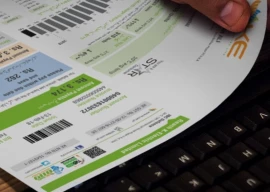



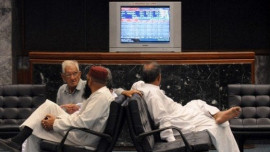
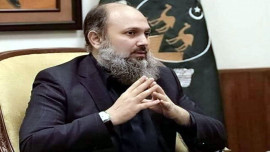

1735283394-0/sidra--(9)1735283394-0-270x192.webp)
1735299255-0/sidra--(18)1735299255-0-270x192.webp)
1720030784-0/Smog-free-Lahore-(14)1720030784-0-270x192.webp)
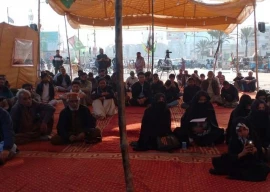
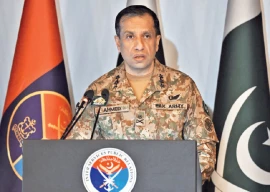

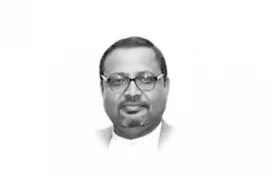




@Ayaz Munir *India is very concerned when it has seen a growth rate of 5.3% last year.
Bro .. 5.3% was 4th Quater growth between Jan - April 2012, 2011 - 2012 growth was 6.5% . But your rite we are extremly extremly worried and unhappy with this. Our govt is also no better , there is complete paralysis in reforms.
@Max:
Thank you for your kind words and your confidence. I will wait till the budget!
This is a GOVERNMENT publication and aims to put the best face on a bad situation. I have edited many of these publications in my past life -- and not all were accepted!
All is not lost. There is still time to change course. But I cannot see that happening in an election year. But that is not unique to Pakistan. Election years are always bad for economic imperatives.
@nomi: . You stated : Most complacent FM in the history of this country. Could not initiate even a single reform. Investment is at its lowest, longest spell of double-digit inflation, average growth rate of 3% when our neighbors are growing above 6%, average fiscal deficit of 6%. In 2005-06 our total debts were Rs.4.4 Trillion. By end of June, 2012, debts are likely to be Rs.12.4 Trillion – an almost 3 times increase. What did we do wrong to deserve such a finance team? . Sorry you are too late. . As per the State Bank of Pakistan Website Pakistan's Debt and Liabilities Summary the Total Debt and Liabilities of Pakistan on 31st March 2012 is Pak. Rs. 13,248.8 Billion i.e. 13.2488 Trillion! . As such by the end of June 2012 the Figure should reach Pak Rs. 13.5 to 13.75 Trillion. . Cheers
the way he's holding the survey report it seems as if it's some nobel winning research paper.
I feel its a big shame for our country. Our Finance Minister is getting happy on a growth rate of 3.7% only, on the other hand India is very concerned when it has seen a growth rate of 5.3% last year. Just shows where Pakistan stands in the region in particular & the World as a whole.
I think that the people would still not stand up, we will still do the same that is, lie on our beds & abuse the politicians for destroying the country, whereas forgetting that we also hold an adequate share in the abusing
I earn a respectable amount of money though a year earlier it took almost 25 days to empty my pockets, now i am done till 10th of every month.
3.7%...r u kidding me?
. Most of the Economic Figures are based on a Population of 180.71 Million whereas the Pakistani Population per the 2011 Census is 197,361,691 as per the following Article : . http://www.thenews.com.pk/Todays-News-13-13514-Population-shoots-up-by-47-percent-since-1998 . [Population shoots up by 47 percent since 1998][1] . This should bring down the Per Capita Figure of US$ 1,372 in 2011-12 to US$ 1,256 which is below the 2010-2011 Figure of US$ 1258 . Cheers . [1]: http://www.thenews.com.pk/Todays-News-13-13514-Population-shoots-up-by-47-percent-since-1998 Population shoots up by 47 percent since 1998
@Meekal Ahmed: It is time for you to reflect on this survey since you can analyze it better than any of us. Looking forward for your op.ed. Regards,
@gp65: what is this obsession with the size of an economy? Does it matter?
Does this make sense.. Where common man is suffering badly . And the claim we have improved from last year but not be able to achieve our targets...Where is that so called improvement !!! And have you achieved any of your targets !!! There's a real question on these figures given as these people have lost their credibility .From past year 4years the inflation has not come to single digit .
@Muhammad Omar:
I miss Zia-ul-Haq´s time when pakistan achieved highest growth and economic stablility.
Can someone please request Mush to come back and take over again?
@hasan: "We are doing better than India. India’s economy is going down. We will be a trillion dollor economy before india "
YEs Indian growth is slowing down. But last quarter the 'slow' growth was 6.1% whereas your finance ministers hopes that in medium term he can accelerate growth to 5.6%. See the difference? India became a trillion dollar economy in 2007. Pakistan is a 200 billion dollar economy and has a long way to go before it comes a trillion dollar economy.Looks like our economic team is in collusion. FM happy with mere 3.7% growth rate (negative real growth after taking inflation impact? ) and the SBP Governor gives an damaging interview which results in rupee sinking to record low. Budget 2013 would be election friendly.....so I would be paying more taxes on my salary and looters would be giving free perks to lota workers and lota voters in name of BISF and what not like today AD by our longest serving PM. OUCH it hurts....to see this happening.
@Khan: This is Real GDP
@Khan: growth figures are always real inflation-adjusted figures. Nominal would be real plus inflation -- or about 15%.
Joke of the century
I miss Musharraf time.
@hasan: Hasn Indian economy is already a trillion dollar economy .Keep dreaming.. it has whizzed past us ..also even if it has slowed down this year still it would touch 7 % and face it India dont need friends ..countries like US wants India to be its friend coz of its rising status
Finance Minister should admit his failure in (not)managing the macro economy of the country and resign. Ask the men on the street and he will say these numbers are far from correct.The pinch an ordinary citizen is facing due to economic mismanagement is un-imaginable
@hasan: India's economy is $1.8 Trillion .. It will be $2 trillion by next year end even if it grows at modest 6% ...
On paper it is, what about real world?
We are doing better than India. India's economy is going down. We will be a trillion dollor economy before india because india's inflation is very high and we have china as our friend while india has no one as friend. As china is already a trillion dollor economy and we are great friends china will make us also a trillion dollor economy and hindu india will only see that.
Well he should be kept as part of the blame because people around him are the most incompetent ones and corrupt. But these figures are a real worry......
One wonders if even these numbers are accurate. The govt has every reason to lie in order to show a smaller fiscal deficit as a % of GDP in order to secure an IMF bailout.
Most complacent FM in the history of this country. Could not initiate even a single reform. Investment is at its lowest, longest spell of double-digit inflation, average growth rate of 3% when our neighbors are growing above 6%, average fiscal deficit of 6%. In 2005-06 our total debts were Rs.4.4 Trillion. By end of June, 2012, debts are likely to be Rs.12.4 Trillion - an almost 3 times increase. What did we do wrong to deserve such a finance team?
He lied with confidence, lucidity and with barefaced, knowing full well that we people of Pakistan don’t matter. He was self assured by our lack of purpose of life and our idiocy. One more term to such like people , and Pakistan will be a history. Pakistani Democracy has put Pakistan into the biggest crises of its existence.
Joke of the day !!! and you must be proud of it.
What a total failure!
Hafeez Shaikh is an unmitigated disaster on Pakistan. Such bad financial management where IPPs aren't paid on time, electricity distribution is skewed , inflation is in double digits...
He needs to resign.